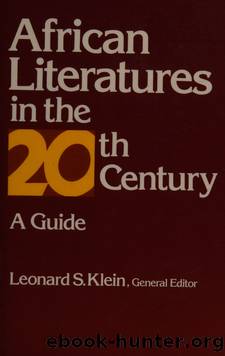African literatures in the 20th century : a guide by Unknown

Author:Unknown
Language: eng
Format: epub
Tags: African literature -- History and criticism, Littérature africaine -- Histoire et critique, Écrivains africains -- Biographies, African literature
ISBN: 080446362X
Publisher: New York : Ungar Pub. Co.
Published: 1986-12-15T00:00:00+00:00
ACHEBE, Chinua
Nigerian novelist, poet, and short-story writer (writing in English), b. 15 Nov. 1930, Ogidi
In 1953 A. became one of the first graduates of University College, Ibadan. He began working for the Nigerian Broadcasting Service the following year, and in 1961 became Director of External Broadcasting for Nigeria, a position he held until 1966, when he returned to his home in eastern Nigeria. During the Nigerian-Biafran conflict (1967-1970), A. worked for the Biafran government and afterward became a research fellow in the Institute of African Studies at the University of Nigeria in Nsukka. In 1972 he was appointed visiting professor in the English department at the University of Massachusetts at Amherst. Four years later he returned to the University of Nigeria in Nsukka, where he is a professor of English.
Working within the conventions of the realistic novel, A. has succeeded in creating a very vivid picture of African society in the process of change. His first novel. Things Fall Apart (1958), deals with the
human consequences of the collision of African and European cultures in Nigeria, a theme that has preoccupied Nigerian writers ever since. The story is set in a traditional Igbo community at the turn of the century, when the first European missionaries and administrative officials were beginning to penetrate inland. One of the strongest men in the community tries to arouse his people to oppose the white man, but some of them have been won over to the white manâs faith, and the clan is no longer united. When his people refuse to follow the protagonist, he commits suicide in anger and despair; his death symbolizes the passing of the old order.
In his second novel. No Longer at Ease (1960), A. switched to a modern urban scene in order to focus on the life of an educated Nigerian in the late 1950s. The protagonist, an idealistic young man who returns from university education abroad with the ambition of reforming the Nigerian civil service, eventually succumbs to the temptation of accepting bribes. He also alienates his people by falling in love with a young woman they find unacceptable. Like his grandfather, the hero of Things Fall Apart, this headstrong young man can be seen as a victim of the conflict of cultures in Africa; westernization has made him confused, ill at ease in his own society, and vulnerable to corruption.
In Arrow of God (1964), A. moved back to an earlier era to tell the story of an old Igbo priest who tries to cope with the changing times by maintaining a flexible stance. He compromises with the new religion by sending his son to a mission school and cooperates with the British administration by testifying against his own people in a land dispute. But these actions subvert his authority in the community, and his people gradually turn away from him and his god and start worshiping at a mission church. Again Africa loses out to Europe; a traditional way of life is destroyed forever.
A Man of the People (1966) concludes A.
Download
This site does not store any files on its server. We only index and link to content provided by other sites. Please contact the content providers to delete copyright contents if any and email us, we'll remove relevant links or contents immediately.
Machine Learning at Scale with H2O by Gregory Keys | David Whiting(4292)
Never by Ken Follett(3937)
Harry Potter and the Goblet Of Fire by J.K. Rowling(3848)
Unfinished: A Memoir by Priyanka Chopra Jonas(3381)
Fairy Tale by Stephen King(3370)
The Man Who Died Twice by Richard Osman(3072)
Will by Will Smith(2907)
Rationality by Steven Pinker(2352)
It Starts With Us (It Ends with Us #2) by Colleen Hoover(2340)
Can't Hurt Me: Master Your Mind and Defy the Odds - Clean Edition by David Goggins(2323)
The Dark Hours by Michael Connelly(2300)
The Storyteller by Dave Grohl(2228)
Friends, Lovers, and the Big Terrible Thing by Matthew Perry(2219)
The Dawn of Everything: A New History of Humanity by David Graeber & David Wengrow(2193)
The Becoming by Nora Roberts(2188)
The Stranger in the Lifeboat by Mitch Albom(2113)
Cloud Cuckoo Land by Anthony Doerr(2098)
Love on the Brain by Ali Hazelwood(2059)
Einstein: His Life and Universe by Walter Isaacson(2009)
